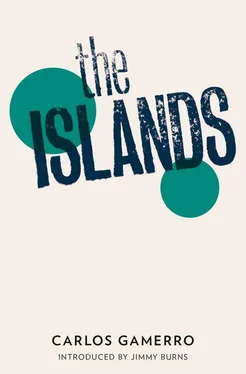Near the kiosk I was stopped by a girl, holding a biro and some form or other attached to a clipboard. She had bushy eyebrows and beautiful brown eyes that reminded me of the cow’s. ‘I’m not in the mood for surveys,’ I told her.
‘It’s a student petition,’ she replied.
‘What are you asking for?’
‘We’re asking for animals to be killed more humanely.’
‘If by humane you mean human, I reckon your wish has been granted,’ I answered angrily, pointing to the shed.
‘Less cruel,’ she corrected herself and held out the biro.
I signed, muttering an apology and trying to look into her eyes, if only once; but she kept her long curved lashes lowered all the time. I gave her a polite peck on the cheek before I went.
When I reached the gate I turned round to see if she was following, but the field was empty. The sun was setting over a horizon broken only by the line of trees and the odd building; in the absence of any wind a column of brown smoke was rising almost vertically from a tall crematorium chimney. The illusion was complete: the gloomy pavement by the grounds of the old Warnes Hospital was a relief as long as it led me as far away as possible from the sunny fences of Buchenwald.
Right next to the Faculty of Veterinary Science, where the blocks are a third or a quarter of normal size and separated by toy streets named after European cities, is one of the most extraordinary neighbourhoods in the city (at least for those with more of an eye for the magical than the practical aspects of maps): Parque Chas. In my faithful Filcar I easily located the precise point from which all that enchantment radiated: an oval of concentric streets divided into six slices of pie by diagonal streets meeting at a perfect central egg. What spaced-out architect must have decided, for once, to relieve Porteños of the rigid Cartesian draughtboard that hems them in on all sides, and build in some forgotten corner, between the straight and angular tracks of commerce and industry, this spider-web of streets as slender as silk threads? Just across the roar of Avenida Los Incas, the dark curve of the first lane, Dublin, left the rush-hour city behind me and enfolded me in silence. I walked through the wintry smell of damp gardens, guided only by the islands of light made by the sixty-watt bulbs (every other one burnt out) and the slits of yellow light filtered here and there by the half-open curtains or lowered blinds. I took a shortcut down one of the spokes to reach the hub of the web, crossed the inner circle of Berlín and reached the incredible point where six corners pointed to a void of tarmac lit by a single, solitary mercury street light. Every ring had left a couple of decades behind, and at the hub, every corner — save one — boasted a shop removed from the ceaseless currents of the city by this eddy in time: an apothecary’s with remedies in big glass jars, a kiosk with goodies from my childhood, a greengrocer’s with yesteryear’s prices written in chalk on a clapped-out blackboard; a Peronist Party Office, closed; an empty shop that gave no hint of what it last sold; pavements with no people; streets with no cars; and, bridging the void, between the telegraph poles of the six arrowheads, a tangle of electricity and phone cables silhouetted against the expectant sky. Only one of the corners was occupied by a house, a modest slice of the pie with white brick walls and dark green shutters and a flat terrace, from which a sparse array of geraniums and ferns peeped incuriously. I rang the doorbell, hanging from its wires at one side of the wooden door.
I heard the pattering of feet approaching down the passageway, a muffled shout of warning, strange squawks; then the door flew open and two little girls, looking astonishingly like penguins, threw themselves round my legs.
‘Malvina! Soledad!’ a voice called to them from inside, and I looked up to see a figure walking briskly down the lighted passageway. I asked her name, and when she’d confirmed it (Gloria) I explained why I’d come. Her expression flicked from alarm to suspicion, then annoyance, then back to suspicion; it was obvious she’d like to have slammed the door in my face, but that would have left the girls on the outside, with me.
‘Surprise? Do you take me for a complete bimbo? Do you want to come in and see the number of boxes I’ve been landed with?’
The question was eminently rhetorical, but as it might be my only chance, I muttered ‘Ok’ and barged in and, by the time she’d realised, I was in the living room with the two girls, who wouldn’t let go of my trousers and had begun to mmmmm with contentment.
‘What pretty girls. Are they yours?’
I could see them better in the light of the living room. They were about ten years old, both on the short and compact side, not quite obese, with little almond eyes, cheekbones criss-crossed with purple filigree, and long pointed noses. They walked clumsily on land, lurching unsteadily and lifting their short arms slightly for balance, but even so they clung to my legs and gazed up at me myopically. Twins.
‘That’s the wrong face you’re wearing. Try another one.’
‘It’s just that it’s the first time I’ve seen twins … who both had, you know … the syndrome …’
‘Mongoloids.’
‘That’s the one. They look like penguins,’ I added. If it was honesty she wanted, I had skip-loads for her.
There was a pile of Christopher products in the middle of the living room and my suggestible imagination gave it the shape of an igloo. Looking more closely, I saw that it did in fact form a little house with an entrance at one side.
‘That’s all they were good for in the end: a playhouse for the girls. Can you see me buying any more?’
I explained about the prize and wrote out the cheque — the usual lie. She calmed down a little, though she still eyed me suspiciously as she invited me to sit down. I chose one of the green-velvet armchairs; immediately, the two girls came over, one on each side of me, and rested their heads on the arms of the chair for me to stroke them. Gloria smiled as she watched them.
‘At least the girls like you. Forgive me for being so beastly just now, but I find it hard to believe that Surprise are giving instead of taking away.’ She held the cheque up to the light. ‘A thousand dollars?’ I saw the happiness in her: not a trace of greed, and, for the first time, I felt like a piece of trash about what I was doing. ‘At least the girls and I get some of what we lost back. I never had it in me,’ she said pointing at the pile of products, ‘to screw a friend or an acquaintance the way I’ve been screwed. Forgive me,’ she repeated. ‘I’ve been on tenterhooks for a week.’
‘Why a week?’
‘A week last Wednesday I went to your company’s meeting to see if I could give the products back, and they told me to piss off. It was all the money I had.’
She was, I suspected, elegantly circumventing their real reply, and was back on the alert. She’d had another look at the cheque and put it to one side for the time being, rather than pasting it to her eyes like her predecessors. I knew I risked blowing everything with the next question, but I was so anxious I couldn’t delay it any longer.
‘Alone,’ she replied. ‘Didn’t I tell you I haven’t got it in me to rope other people into this shitty business?’
That’s it, I thought. She’s said it. The only thing left for me to do now is to think what to tell Tamerlán. Why? Why did I have to come up with Witness No. 26? I’d dug my own grave. Yet again.
‘Something the matter?’ she asked, startling me. I hadn’t thought it showed; poker faces are usually my specialty. ‘You’ve gone all …’ she said.
Читать дальше











